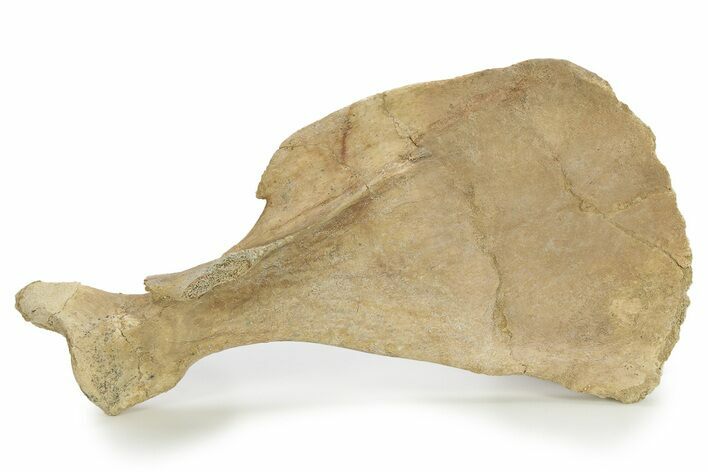This Specimen has been sold.
14.8" Fossil Primitive Whale (Pappocetus?) Left Scapula - Morocco
This is a 14.8" long left scapula bone from a protocetid cetacean (early whale ancestor). The bone comes from the Middle Eocene-age Aridal Formation, located in the Western Sahara near Gueran, Morocco. With this deposit producing a relatively abundant amount of Pappocetus lugardi jaws and teeth, it's possible that this specimen could be labeled as so. However, due to the lack of described post-cranial Pappocetus lugardi material, we have left the species with a question mark.
It comes with an acrylic-metal display stand to assist with presentation.
The bone is fairly complete, with a few spots of crack repair and gap fill restoration. Much of the restoration along the thinnest portions of the bone is purely surface restoration.
It comes with an acrylic-metal display stand to assist with presentation.
The bone is fairly complete, with a few spots of crack repair and gap fill restoration. Much of the restoration along the thinnest portions of the bone is purely surface restoration.
About Pappocetus
Pappocetus is a genus of extinct protocetid cetacean. Protocetids are considered to be one of the earliest examples of whale development during the time they were transitioning from land to sea. Fossil records indicate that they are Middle Eocene in age, existing after Pakicetus (earliest known whale) and prior to Zygorhiza (basilosaurid). These protocetids had become much more whale-like in appearance, featuring a more streamlined body with paddle-like forelegs, and hind-limbs that were greatly reduced in size. Their robust teeth and root structures suggest that they were aquatic carnivores, relying on smell and vision as their most important senses for hunting prey. It's unlikely that by this point they had developed echolocation systems used by modern whales.
Pappocetus is a genus of extinct protocetid cetacean. Protocetids are considered to be one of the earliest examples of whale development during the time they were transitioning from land to sea. Fossil records indicate that they are Middle Eocene in age, existing after Pakicetus (earliest known whale) and prior to Zygorhiza (basilosaurid). These protocetids had become much more whale-like in appearance, featuring a more streamlined body with paddle-like forelegs, and hind-limbs that were greatly reduced in size. Their robust teeth and root structures suggest that they were aquatic carnivores, relying on smell and vision as their most important senses for hunting prey. It's unlikely that by this point they had developed echolocation systems used by modern whales.
SPECIES
Pappocetus lugardi?
LOCATION
Gueran, Boujdour, Western Sahara, Morocco
FORMATION
Aridal Formation
SIZE
14.8 x 7.7"
CATEGORY
SUB CATEGORY
ITEM
#277456
We guarantee the authenticity of all of our specimens.
 Reviews
Reviews












